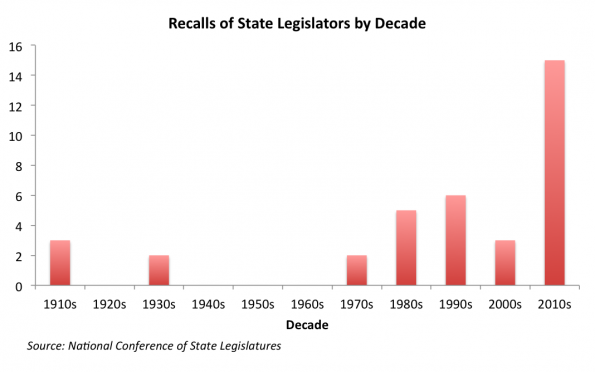Several state legislators in Colorado are currently facing the threat of a recall election. This is happening not because of any alleged criminal or immoral activity on their parts or because they somehow sullied the reputation of the state government. Rather, it’s because they voted for several gun control restrictions earlier this year, and that made gun rights activists mad. The recall campaign against John Morse, the Democratic president of the state senate, just submitted more than twice the required number of signatures to get its target’s recall on the ballot. Morse will likely soon face the choice of fighting to defend a very competitive seat in a non-election season or resigning to keep the seat in Democratic hands.
If you’re thinking that recall elections have become more commonplace lately, you’re entirely right. The National Conference of State Legislatures keeps records of all the state legislative recalls since the practice began in 1913. Here’s what the numbers look like, by decade. The chart below includes both successful and unsuccessful recall elections.

Keep in mind that these numbers only go through June of 2012, so they don’t include any of the current recall campaigns going on in Colorado. Also keep in mind that this decade isn’t even halfway done, and we’ve already seen 15 recalls.
Now, I should note that the recent increase in recalls is driven strongly by events in Wisconsin in the wake of that legislature’s vote to strip public-employee unions of collective bargaining rights. That produced nine recall attempts in 2011 alone. It’s also important to note that the number of recalls is still very small; there are nearly 7,400 state legislators across the country. But there doesn’t have to be a lot of these things to have a chilling effect on legislators. When one gets recalled, her colleagues notice.
In a paper I did with Jeff Lewis and Thad Kousser, we found that California state legislators serving during the 2003 recall of Democratic Governor Gray Davis changed their voting patterns after that election. In particular, Democratic legislators began voting in a more conservative fashion for the remainder of that session. So these sorts of recall elections, when successful, could end up shaping the output of legislatures in the aftermath.
What these numbers suggest is that the recall, much like the filibuster or a vote against the federal debt ceiling, is one of those rarely-used political tools that suddenly becomes commonplace during a period of intense partisanship. Using them for regular political disagreements, rather than for extraordinary cases of malfeasance, may seem crass and opportunistic. But if you have these tools lying around, they’re simply too tempting for a member of an aggrieved minority party to ignore.





